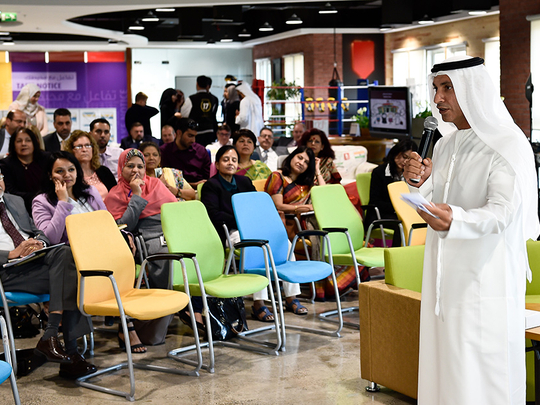
Dubai: The performance of private schools in Dubai is in line with National Agenda targets, newly released data suggests.
The schools are on par with high-achieving countries in TIMSS (Trends in International Mathematics and Science Study) and Programme for International Student Assessment (PISA).
High rankings in TIMSS and PISA are among the National Agenda targets set for 2021, part of the UAE Vision 2021.
On Monday, the Knowledge and Human Development Authority (KHDA) announced that the performance of Dubai private schools for grade eight in TIMSS 2015 was on par with schools in the top 15 high-performing countries, which is a 2021 target.
Also, in PISA 2015, Dubai private schools have performed similar to schools in the top 20 countries in reading and in science – another 2021 target.
TIMSS 2015 and PISA 2015 national results were announced in late 2016 but Dubai’s comparative performance as being in the league of top achieving countries was revealed on Monday during a meeting of school principals at KHDA to discuss the future of international assessments.
TIMSS is held every four years and its latest round was in 2015, when 13,000 Dubai students took part. Pupils in Dubai have for the first time risen above the international average of 500 points.
Meanwhile, PISA is held every three years, with its most recent cycle held in 2015. The results from Dubai showed students improving six points in science, four points above the global average. In reading, they improved by eight points in reading, ranking them at the global average.
Dr Abdulla Al Karam, director-general of KHDA, said: “School leaders have played a very important role in our journey to work towards achieving the UAE national agenda goals and the latest international assessment results are a reflection of their hard work. Together with the teachers, students and parents, we have to continue in this journey and make significant progress.”
Dr Rabaa Al Sumaiti, executive director of international assessments at KHDA, said: “The close alignment between school inspection ratings and international assessment results means that we are able to have an annual, accurate measure of schools’ progress with the UAE National Agenda targets. This alignment also gives international validation to Dubai school inspections, and provides parents, school leaders and investors with essential insight on school quality in Dubai.”
The next round of PISA, in 2018, can be more “challenging” if “students are not strong, independent readers; if they don’t enjoy reading”, because reading will be a main domain area in PISA 2018, Dr Al Sumaiti said.
She added that students may find the next TIMSS, in 2019, “tricky” as it will see a “major change” from a paper-based to a computer-based assessment that will include new test items.
By March, Dubai schools will be receiving their individual performance results for TIMSS and PISA, Dr Sumaiti said.
She added that Dubai schools have also started taking other international benchmark tests on an annual basis, apart from TIMSS and PISA, which also contribute towards achieving National Agenda targets.
However, on a national level, the overall average for the whole of the UAE is still under 500 points in the latest TIMSS cycle.
Meanwhile, for PISA 2015, the UAE ranks 46 in science, 47 in maths and 48 in reading, based on average national scores of 15-year-olds who sat the tests. In order to meet the 2021 target, the UAE must be among the top 20 performing countries.












